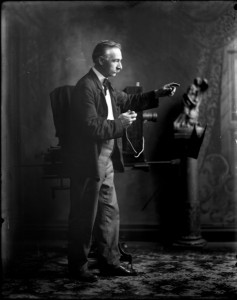
Figure 1 – Photographer of Oscar Grossheim, in his Muscatine, Iowa studio around 1910. From the Wikimedia Commons. Original image from the Musser Library and in the public domain.
We recently discussed the statement that “I never look good in pictures.” There is an implicit viewpoint in that statement, namely that somehow the camera is conspiring against you, that the camera has a mind of its own and a rather devilish one at that.
Early cameras were huge cumbersome things. Consider for instance the monstrous camera in Figure 1 which shows Oscar Grossheim in his Muscatine, Iowa studio around 1910. In an age of scientific emergence the camera was a marvel indeed, and it is not difficult to imagine that it somehow seemed to have a life of its own, and ominously one that captured souls.
At first the camera was seen as a machine that in an instant produced a perfect portrait of a person or image of a scene. But soon it was realized that the camera often caught details that the eyes would miss – that it was capable of shifting the mental focus of an image. This meant that the camera, really the photographer, was capable of creating an interpretive image. Arguably the photographer unlike the painter was constrained by the physical world. There were physical laws that could not be violated. I would suggest however, that all artistic media possess restraints. It is just that those of the camera are different than those of oil paints or acrylics, marble or bronze.
Still, sitting for a painter was quite a different story and experience than surrendering your soul to that mechano-optical box that feigned indifference. And the box was omnipresent well into the twentieth century. You had to deliberately carry it along when you wanted to capture life’s moments. You had to load it with the magic film. You had to take it out of its case. You had to focus it.
In the twenty-first century all of this deliberateness is gone. We always carry cameras with us as part of our cell phone “communicators.” They are there to photograph, to transmit, and to share. But we don’t think about it. We just point and snap even take “selfies” with the Pope. The camera has lost its personal identity. It has become part of us.
The paradox here is that modern cameras, unlike the cameras of the last century, truly have their own brains and identities. Typically you’re not responsible for the beautiful image; the camera is. This is truly become what Ray Kurzweil has called “The Age of Spiritual Machines,” where your camera or cell phone might actually think. But our sense of cameras is different. They are silent partners now, their presence goes almost unnoticed and as a result we no longer fear them as “soul catchers.” Perhaps they have already stolen them.
